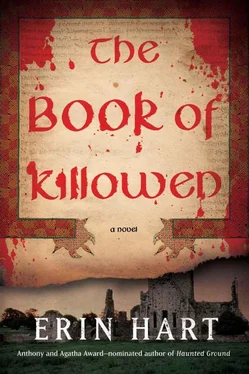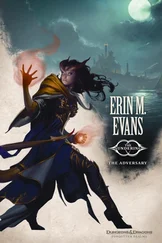He sensed a slight flicker of hesitation in her eyes, then it was gone. “Yes… where is it we are going?” she asked.
“I’m sorry. I did explain all this to the woman at the agency but it’s all been so rushed. We’re headed to Tipperary, it should only be for a day or two. The lodging is all sorted—we’re staying at some sort of artists’ retreat. You’ll have your own room, of course, and access to kitchen facilities, everything you’ll need to look after my father—although we won’t really have to fend for ourselves; it’s the sort of place where the cooking is done for us. Nora and I will be able to help you, when we’re not out at the site.”
“Tipperary?” she said. “I didn’t know there truly was such a place.”
“Oh, yes,” Cormac said. “And not even such a long way as you’ve probably supposed.” He checked his watch. “In fact, if we can manage to push off soon, we might even arrive in time for lunch.”
They had just crossed the Tipperary border outside Birr when Nora glanced down at the map. Better start paying attention; she was meant to be navigating this last bit of the journey to their lodgings. The drive had taken them out of Dublin, southwest along the M7, through Kildare and Laois, and now into the area known as Ely O’Carroll. She rode in back with Joseph nodding beside her; Cormac and Eliana sat in front, and she enjoyed listening to the buzz of their conversation without hearing exactly what was said. Now and again a word or phrase would float back to her—Cormac inquiring about Eliana’s home in Spain, she asking a few general questions about the daily routine. Nora was grateful to be left alone with her thoughts.
She let her gaze caress the back of Cormac’s head, admiring, as she so often did, the curve of his skull, how pleasingly it intersected with the angle of his jaw. Whenever he turned to speak she once again remembered the meandering path those same lips had traced across her bare skin only a few short hours ago.
That intimate portion of her life, in particular, didn’t seem quite true. She felt the unreality most acutely each morning when she awakened beside him. Would she ever learn to stop holding her breath, waiting for the next bad thing to happen? Lately she had begun to feel a gradual easing, another few degrees of difference each day, but would it ever be enough? After wandering so long in the underworld after her sister’s death, the past year had felt like trying to claw her way back into the realm of the living. She had yet to face the fight for her niece’s good opinion, a struggle that hadn’t yet begun. Elizabeth refused to see her, wouldn’t even speak her name. You couldn’t blame the child for clinging to her father’s memory, refusing to accept the part he had played in her mother’s death. Cormac kept saying that Elizabeth would come around, but it hadn’t happened yet. And Nora refused to press. How could you ask a twelve-year-old to see such things?
She glanced over at Joseph, nodding beside her. In some ways, he remained in a shadowy otherworld, bound by a tangled thicket of words without meaning. As she studied the delicate, translucent skin at his temples, the darting movement under his eyelids, she wished for even a fleeting glimpse of the images taking shape inside his head. Were a person’s dreams transformed when words slipped their meaning?
They had spent a lot of time together in the back garden these past few months—she on her knees in the dirt, Joseph basking in a chair—on the days when the sun god deigned to show his face. After her own father, she’d taken to cultivating roses and had found restoration in tending to growing things. Cormac’s father, too, seemed to find a sense of calm in being surrounded by virescent life. The back garden had become an oasis for the two of them.
In all the days they had spent together, she had yet to discern any sort of pattern in Joseph’s speech, or to crack the garbled code of his stroke-damaged brain. He could speak quite easily, and indeed often rambled on and on, but there seemed no logic to it—one day “fork” meant “tree”; the next day it meant another word entirely. That was the trouble—if there was a code, it was corrupt, the circuits faulty. Only his frustration level remained constant.
Once in a great while, he would have a small breakthrough. Two days ago, she’d been standing at the kitchen sink doing the washing up after supper, looking out into the garden and absently singing under her breath the words of an old song that she and Tríona used to sing to pass the time on long car journeys:
Up the airy mountain,
down the rushy glen,
We daren’t go a-hunting
for fear of little men—
She heard a noise and turned to find Joseph standing behind her. He’d looked agitated, his collar askew, white hair sticking straight up from the side of his head.
“Can you do her angle?” he said, and opened his mouth. “Bowling over, to-to-to give it up. Get up the barking again.”
Did he want her to keep singing or to stop?
“The barking! Um, umma.” He took her by the hand and gestured to his mouth, to suggest something pouring out. “Do-do the hemming!”
She began to sing once more, slowly drawing out the words—“Up the airy mountain, down the rushy glen”—and watching as his lips began to move, following along.
He joined in then, each word perfectly formed and clear: “We daren’t go a-hunting for fear of little men.”
She pressed on: “Wee folk, good folk, trooping all together.”
Joseph finished the line once more, on his own, in a scratchy but rather tuneful baritone: “Green jacket, red cap, and white owl’s feather!”
He let her hand drop and shook his head. “Ah, God, a shinna what’s gone,” he said. And then, with sudden vehemence, “Feckin’ gyroscope!”
They stared at each other for a long moment.
“You can say that again,” she’d offered.
“Feckin’ gyroscope ,” he growled.
It had taken her a moment to realize that he had repeated himself—on purpose. He seemed to detect that some shift had occurred as well. His face began to screw up. She had thought at first that he might weep, but the sound that trickled from him was a barely audible chuckle, which grew into a chortle, and then to a full-throated guffaw, which Nora couldn’t help joining in—especially when she realized that it was the first time she had ever heard him laugh. When Cormac had entered the kitchen a few minutes later, he’d found them both propped against the cupboards, weak from laughter.
The stroke literature talked about how memorized words and phrases were sometimes unaffected by stroke damage, how they were apparently stored in a separate place in the brain. Joseph had once come out with a few phrases in Spanish, but since neither she nor Cormac spoke Spanish, they couldn’t tell whether he was making sense. So many mysteries left inside the human skull. She often imagined how much more difficult the current situation must be for Cormac than it was for her, since she had never met Joseph Maguire before his words had become disconnected. To Cormac, the contrast between this absurd, nattering old man and the larger-than-life figure his father had once been must be more than shocking.
A few words of conversation floated to her ears from the front seat.
“—and is this your first time in Ireland?” Cormac was asking Eliana.
“Yes. I wanted a bit more time speaking English before I begin my studies in September.”
Glancing at Joseph, Nora could perceive that his eyes were open, though his drooping posture still feigned sleep. There was probably more understanding than they knew.
“Where will you go to school?” Cormac asked.
Читать дальше












